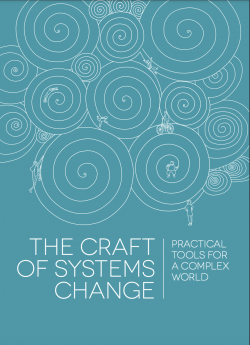The Craft of Systems Change
WWF recently published the second book in the series “The Art and Craft of Systems Change“, facilitated by Book Sprints and written by a group of dedicated, knowledgable authors from the field of nature conservation and systemic change.

Book cover of The Craft of Systems Change
The book addresses those working on nature conservation goals, and on changing the systems we live and work in. While the first book in the series, “The Art of Systems Change”, sprinted in 2019, introduced the principles of systems thinking, the second book focuses on practical tools for different starting points on the systems journey:
The Craft of Systems Change introduces a way of thinking and working called the Systems Journey, which knits together the many ideas, tools, and ways of being in the world that are often traced back to systems thinking and systems change. The Systems Journey encourages readers to engage meaningfully with the systems and the people around us, explore the many different futures we may aspire towards, and learn our way towards a future that works for everyone.
Through the use of practical facilitation tools, readers are invited to look within to deeply engage with what may be preventing change, embrace a learning mindset that can help surface new leverage points in the systems where we work, and adapt our actions to ensure they create the change that we need for a better future.
The journey of writing the book
This Book Sprint was quite a journey in itself. In 2020, when the Covid pandemic hit the globe, it was reorganised quickly to be one of the first fully virtual Book Sprints. The group met online for a week in early 2020 to map out the content. They then came together again in 2020 and in 2021 for writing and editing sessions. During those sessions the writers faced almost any imaginable obstruction that the changing world they wrote about has to offer: From power outages in snow storms and evacuations due to wildfires, to Covid infections, career changes, and welcoming new family members. The extraordinary effort they invested to pull through speaks volumes about the passion and engagement for their work.
In between the online sessions, the writers gathered feedback from colleagues and students in the field. This feedback was used to focus the content and the book’s structure. A small team within WWF Science then edited and illustrated the content. We are very happy that the book is now released! And proud to play a small part in this so very important topic!
